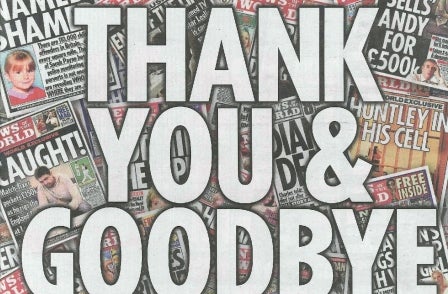
Reading Newsnight editor Peter Rippon’s explanation of why he spiked a report revealing that Sir Jimmy Savile was apparently a serial child abuser put me in mind of the words of former News of the World managing editor Stuart Kuttner.
In 2006 the News of the World published a video showing British squaddies beating young Iraqi men that prompted a backlash against British forces stationed in Basra and potentially put their lives at risk.
At the time Kuttner (who is now incidentally facing trial as part of the hacking 'conspiracy') told me:
We consider these things in the round and the fact is that newspapers, radio, TV and the media are in the business of disclosure without fear or favour The raison d’être of the media and the press is to publish, and it’s the role of journalists to make known things that some will find distasteful, unpleasant and embarrassing. The media should not be in the business of self-censorship.”

It strikes me reading Rippon’s discussion of the finely-balanced public interest considerations that led him to drop an absolutely corking story, that journalists who get bogged down in the public interest pros and cons of publishing can lose their way.
Shouldn’t journalists ask themselves simpler questions? Such as: is this a good story? Is it true? Is there a good reason why I shouldn’t publish it?
Newsnight had spoken to ten women to corroborate claims that Savile was a child abuser. It also established that police had investigated the historic claims against Savile in 2007 but not pursued them.
Rippon does not say that he did not think the story was true. He said the decision not to publish came down to the fact that “we had not established any institutional failure” at the Crown Prosecution Service.
Also, weighing up reasons not to publish, he said:
Newsnight is not normally interested in celebrity exposé. Savile was unable to defend himself. What was the public interest served by reporting it given he is dead? The nature of the allegations and the level of proof required. The fact the incidents were 40 years ago.
But what about the ten women who had gone out on a limb to speak to Newsnight journalists and go on the record about what must have been very painful memories? How must they have felt when the story was spiked? Were their interests not a factor?
And what about the many other apparent victims of Savile who have since found the courage to come forward in the wake of the revelations finally being aired this week? Even just taking the initial ten sources (TEN SOURCES!) – aren’t they entitled to posthumous justice?
There is also the fact that we now know one of those sources told the BBC that she witnessed Gary Glitter having sex with a child in Savile’s BBC dressing room.
All editors make good and bad calls every day, they make the best fist of an impossible job and don't deserve to be vilified when they inevitably sometimes get it wrong. But as Kuttner said, journalists are in the disclosure business and I fear that on this occasion Rippon may have forgotten that point. His reasoning provides a taster of the sort of journalistic world we could all live in if Lord Justice Leveson decides to be too prescriptive in demanding that all controversial stories – ie. anything really newsworthy – has to be justified in the public interest.
Journalists who appoint themselves as guardians of the public interest run the risk of becoming their own censors.
Email pged@pressgazette.co.uk to point out mistakes, provide story tips or send in a letter for publication on our "Letters Page" blog
